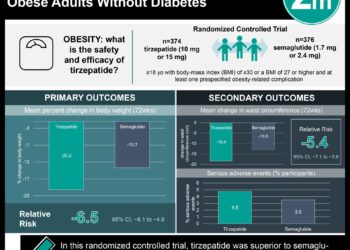School nutritional quality programs associated with lower BMI in children
1. In a retrospective cohort study, the implementation of policies to strengthen nutritional standards in school-provided meals was associated with an overall decrease in BMI z-scores.
2. Decreases in BMI z-scores occurred in the post-implementation period regardless of age, sex, and household income.
Evidence Rating Level: 2 (Good)
Study Rundown: Childhood obesity is highly prevalent across North America with broad implications for long-term health outcomes. Interestingly, there has been a well-described association between school meal programs and obesity. This finding was addressed in the Healthy, Hunger-Free Kids Act of 2010 (HHFKA), which aimed to strengthen nutritional standards in school-provided meals by including more whole grains, fruits, vegetables, and low-fat dairy products. This study aimed to evaluate the impacts of the HHFKA on childhood obesity as measured by changes in youth body mass index (BMI). Using retrospective data from 50 cohort studies, the authors found a significant decrease in the BMI z-score after the implementation of the HHFKA. In sub-analyses, decreases in BMI z-score occurred across subgroups of age groups, sex, and annual household income. The main limitations of this study include potential unmeasurable confounding variables that may lead to changes in BMI in a time-specific manner. This study provides evidence that nutritional policies such as the HFFKA are associated with decreased BMI, showing that improving the nutritional quality of school meals may be a valuable tool for addressing childhood obesity.
Click here to read the article in JAMA Pediatrics
Relevant Reading: Association between state laws governing school meal nutrition content and student weight status: implications for new USDA school meal standards.
In-Depth [retrospective cohort]: This cohort study utilized data from the Environmental Influences on Child Health Outcomes (ECHO) program, which is a nationwide consortium of child cohort studies. 14,121 children aged 5-18 years were enrolled, with height and weight measurements from 50 cohort studies recorded between Jan 2005 and March 2020. Exposure included the Healthy, Hunger-Free Kids Act of 2010 (HHFKA) implementation, with a pre-implementation period from Jan 2005 to Aug 2016 and a post-implementation period from Sept 2016 to March 2020. Heights and weights were used to calculate the BMI z-score (BMIz). The study utilized an interrupted time-series analysis design to assess the annual BMIz change after implementation of the HHFKA when controlling for covariates. Overall, there was a significant decrease (−0.041, 95%CI −0.066 to -0.016) in the BMIz post-implementation of HHFKA, which varies from the estimated trend of increase in BMIz. The decreases in BMIz occurred in both children 5-11 years (−0.034, 95%CI −0.059 to −0.009) and adolescents between 12-18 years (−0.045, 95%CI −0.071 to −0.018, despite BMI increases in pre-intervention period). When analyzed by sex, there were decreases in BMIz post-implementation for males (−0.037, 95% CI −0.062 to −0.012) and females (−0.046, 95%CI −0.071 to−0.020, despite BMI increases in pre-intervention period). When analyzed by family income, there was a decrease in BMIz in youths from families with lower income (−0.038, 95% CI −0.063 to −0.013) and higher income (−0.041, 95% CI −0.066 to −0.016).
Image: PD
©2023 2 Minute Medicine, Inc. All rights reserved. No works may be reproduced without expressed written consent from 2 Minute Medicine, Inc. Inquire about licensing here. No article should be construed as medical advice and is not intended as such by the authors or by 2 Minute Medicine, Inc.







